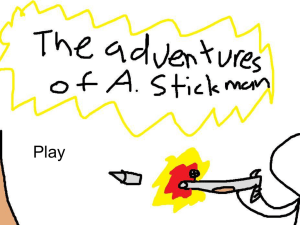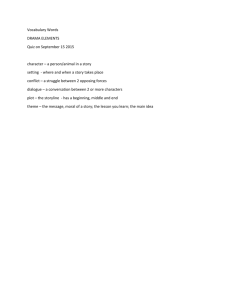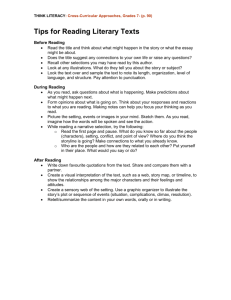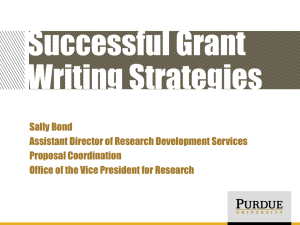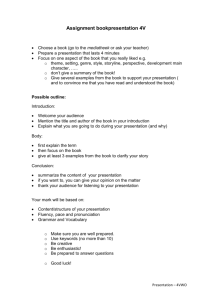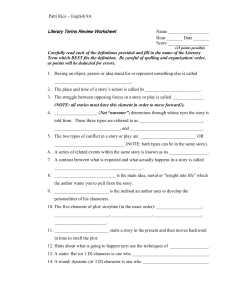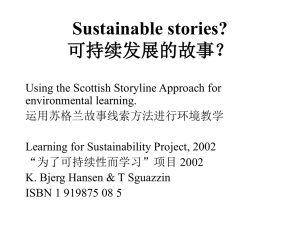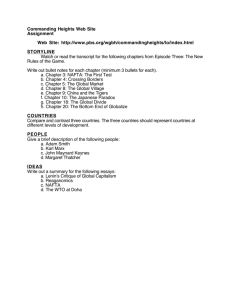Storyline Template
advertisement
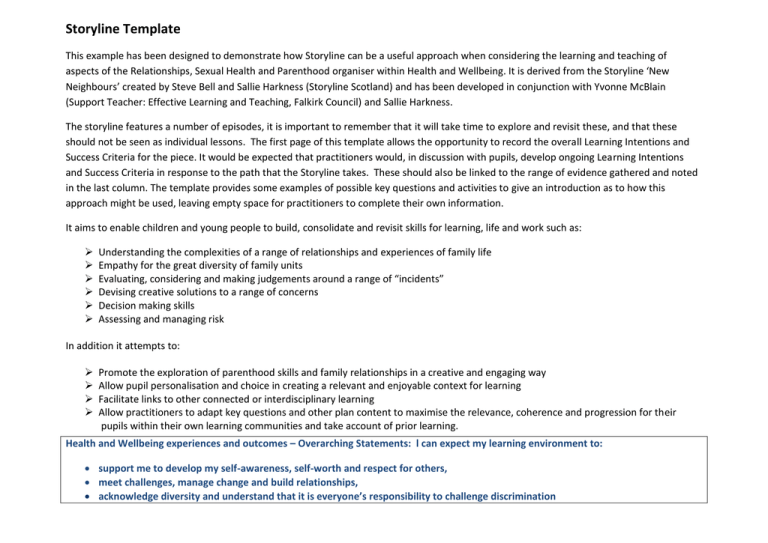
Storyline Template This example has been designed to demonstrate how Storyline can be a useful approach when considering the learning and teaching of aspects of the Relationships, Sexual Health and Parenthood organiser within Health and Wellbeing. It is derived from the Storyline ‘New Neighbours’ created by Steve Bell and Sallie Harkness (Storyline Scotland) and has been developed in conjunction with Yvonne McBlain (Support Teacher: Effective Learning and Teaching, Falkirk Council) and Sallie Harkness. The storyline features a number of episodes, it is important to remember that it will take time to explore and revisit these, and that these should not be seen as individual lessons. The first page of this template allows the opportunity to record the overall Learning Intentions and Success Criteria for the piece. It would be expected that practitioners would, in discussion with pupils, develop ongoing Learning Intentions and Success Criteria in response to the path that the Storyline takes. These should also be linked to the range of evidence gathered and noted in the last column. The template provides some examples of possible key questions and activities to give an introduction as to how this approach might be used, leaving empty space for practitioners to complete their own information. It aims to enable children and young people to build, consolidate and revisit skills for learning, life and work such as: Understanding the complexities of a range of relationships and experiences of family life Empathy for the great diversity of family units Evaluating, considering and making judgements around a range of “incidents” Devising creative solutions to a range of concerns Decision making skills Assessing and managing risk In addition it attempts to: Promote the exploration of parenthood skills and family relationships in a creative and engaging way Allow pupil personalisation and choice in creating a relevant and enjoyable context for learning Facilitate links to other connected or interdisciplinary learning Allow practitioners to adapt key questions and other plan content to maximise the relevance, coherence and progression for their pupils within their own learning communities and take account of prior learning. Health and Wellbeing experiences and outcomes – Overarching Statements: l can expect my learning environment to: support me to develop my self-awareness, self-worth and respect for others, meet challenges, manage change and build relationships, acknowledge diversity and understand that it is everyone’s responsibility to challenge discrimination Storyline Title: Area of focus: Learning Intentions & Success Criteria Learning Intentions: Success Criteria: These should be focused around the actual learning that is taking place. Particular reference should be made to the skills being developed in the relation to the particular aspects of experiences and outcomes being contributed to. These should be explicitly and clearly linked to the Learning Intentions. This is breaking down the learning taking place into things that you might observe children saying, writing, making or doing. These should be used to enable you to make professional judgements about how much and how well children and young people are learning. Storyline Episode 1: Families Examples of Key Questions Possible Learning Experiences Who are the different people who make up a family? Brainstorm family roles to gain vocabulary and existing knowledge of family groups and relationships – record collaboratively as word bank Groups discuss the Which family characters will make-up of their family be in our group's family? and each pupil chooses a character. What do your family members look like? What information can we give about the family members? Each pupil makes a drawing or collage of their family character and the figures are displayed in family groups. Simple biographies giving name, age, family role, job, interests, and two words to describe personality are shared with the class. Methodologies/ Resources Curriculum Areas/Focus of Experiences and Outcomes Gathering Evidence – Say/Write/Make/Do Use this column to track the evidence you gather as you go through the storyline. Notes: Evidence gathered should link back to the Learning Intentions and Success Criteria. As you go through your storyline there will be lots of opportunities for you to gather a range of evidence from what pupils SAY / WRITE / MAKE /DO. It can be helpful to ask pupils when and how they would like to be assessed remembering that assessment should be to support the learning and not just about an end product. Use of open questioning can be helpful in establishing how much and how well pupils have learned. Learning conversations around evidence should focus on how pupils can progress their skills. Storyline Episode 2: A House for each Family Teacher tells pupils that all of their families live in the same street. The class house front and plans can be displayed in the classroom as a frieze or picture or compiled in group /class evidence folders. Examples of Key Questions Possible Learning Experiences What kind of houses will our families need? Collage, drawing or painting of the front of the family home. Teacher models process to create his/her own house What should our family home look like from the outside? Inside our houses, how many rooms will each family want / need? How might these rooms be used by the family members? Simple plan of family home (could be done as large scale drawing outdoors or as a simple composition of coloured squares arranged on paper) Drama task allowing pupils to demonstrate existing knowledge of family activities specific to rooms in home Methodologies/ Resources Curriculum Areas/Focus of Experiences and Outcomes Evidence – Say/Write/Make/Do Storyline Episode 3 : Family Life – routines and activities. Examples of Key Questions Possible Learning Experiences What is our family’s daily routine? Use discussion, a resource or teacher role-play of a character to introduce aspects of personal hygiene What do our characters need to do each day? Drawing of pictures linked to specific times of day – each person in family draws what they would do and when. Do any of the family members have a health concern? What do our characters enjoy doing each day? What kind of things do the families do together? Class then group discussion of hobbies & pastimes enjoyed by families Methodologies/ Resources Curriculum Areas/Focus of Experiences and Outcomes Evidence – Say/Write/Make/Do Storyline Episode 4: Additional supporting information. At this stage your pupils may have contributed ideas which allow you to naturally focus on aspect(s) of Relationships, Sexual health and Parenthood. If not you can introduce a new family, who will move in to the ‘Empty House’ in the street to introduce the focus that you want to take. Pupils should now have developed ownership of their characters. This lends itself to being able to explore more sensitive themes if required through the anonymity of the characters. This episode could be led by the teacher to sensitively focus on issues which have been introduced into the storyline naturally. Alternatively teachers could use the family who have moved into an ‘Empty House’ to introduce a range of incidents. These could include looking at matters around positive relationships through the variety of family dynamics, personal safety, pregnancy, birth, parenting skills, changes in the body, separation and loss. This is not an exhaustive list and there are many opportunities within this episode to introduce a range of incidents or one which is particularly important for you and your learning community. You could also consider which local services and / or partners you might need to support the families in the storyline. Examples of Key Questions Possible Learning Experiences Storyline Episode 4: Incidents and Events To generate pupil ideas: What sad / happy / Brainstorm a list of exciting things do you think possible events. might happen to the families now? Teacher led: What do you think would happen if............? Other helpful questions: Are all of our families happy and healthy? How can we tell? Is someone unhappy/in trouble/needing help? What could the family do to make things better? How could our family / neighbours help to make things better? Teacher selects a range of different ideas to explore. Methodologies/ Resources Curriculum Areas/Focus of Experiences and Outcomes Evidence – Say/Write/Make/Do As you near the end of your storyline it is nice to plan a positive event, involving the families and characters and bringing your storyline to a happy conclusion and celebration. Storyline Episode 5: Culminating Event Examples of Key Questions Possible Learning Experiences Methodologies/ Resources Curriculum Areas/Focus of Experiences and Outcomes Evidence – Say/Write/Make/Do Storyline Episode 6 : Review, Reflect, Respond. Reviewing, reflecting and responding should be part of the ongoing process within the Storyline as well as a final evaluation. Examples of Key Questions Possible Learning Experiences What have I learned from our storyline and about my family and neighbours we created? Brainstorm of learning gained – record on IWB or paper What have I done well during this project? Interview of pupil recorded by adult What can I do even better next time? peer assessment activity What could we do to make this project better for the next class who does it? Language activity recording pupil ideas for improving topic Methodologies/ Resources Curriculum Areas/Focus of Experiences and Outcomes Evidence – Say/Write/Make/Do
